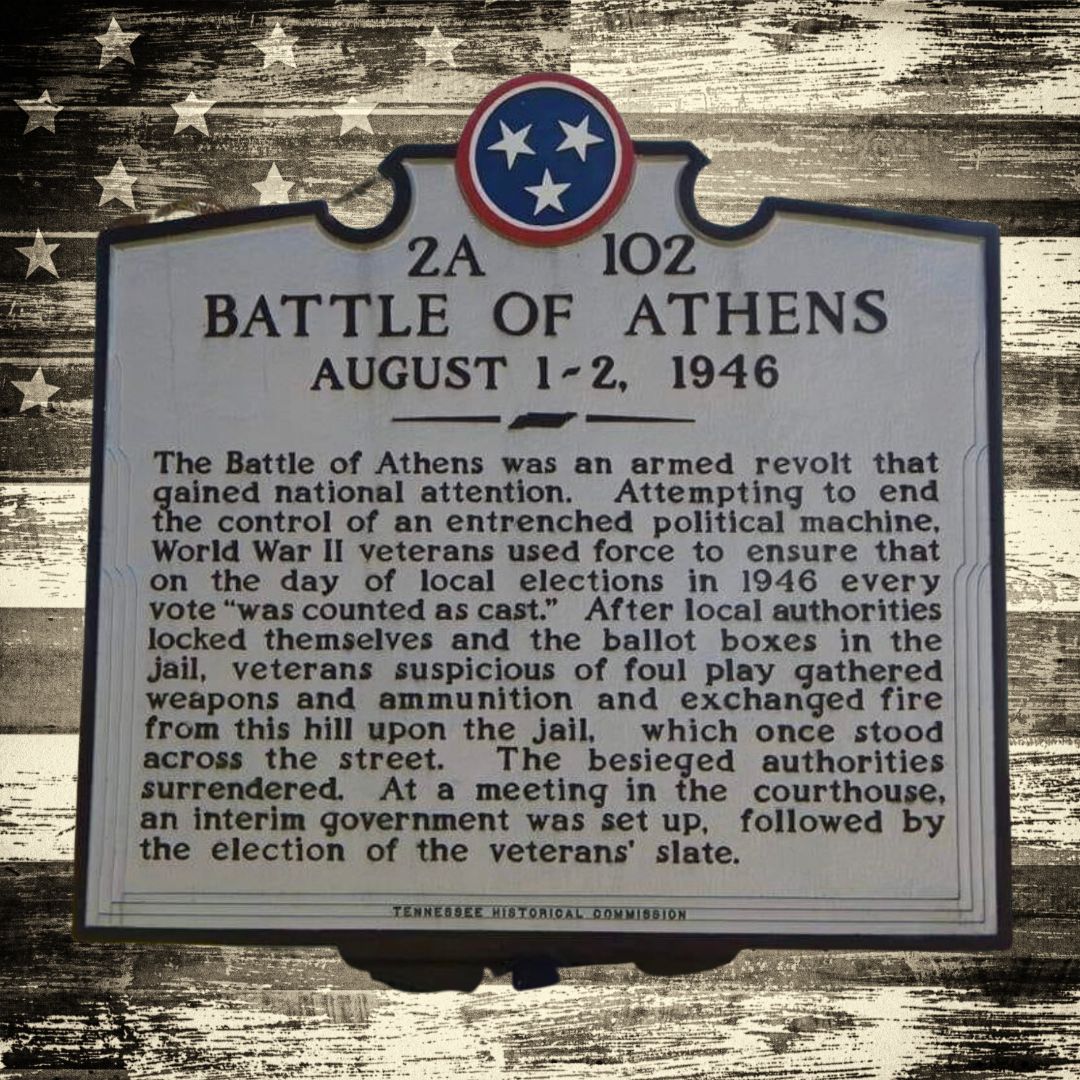
TRUE AMERICAN HISTORY
Share
The Battle of Athens, Tennessee, also known as the McMinn County War, was a political and social conflict that occurred on August 1-2, 1946. The event was a result of widespread corruption and voter intimidation during the 1946 elections in McMinn County, which resulted in a military-style rebellion by local World War II veterans against the local government.
In the early 20th century, the political system in McMinn County was dominated by a political machine run by the Democratic Party. The machine was led by Paul Cantrell, who served as sheriff from 1936 to 1940, and later as a state senator. Cantrell and his associates controlled the local government, including the police, the courts, and the ballot box.
During the 1946 elections, Cantrell ran for sheriff against a coalition of World War II veterans and local Republicans. The veterans, led by a former Army captain named E.H. Crump, accused Cantrell and his allies of widespread voter fraud, including ballot stuffing and voter intimidation.
On election day, tensions boiled over when Cantrell's deputies allegedly opened fire on a polling station in Athens, Tennessee. The veterans and their supporters then stormed the county jail, where the ballots were being counted, and engaged in a fierce gun battle with the deputies.
The Battle:
The veterans quickly organized themselves into a makeshift militia, using their combat training to fortify their positions and repel attacks from the sheriff's deputies. The battle lasted throughout the night and into the next day, with both sides exchanging gunfire and grenades.
The veterans eventually gained the upper hand, with reinforcements arriving from nearby towns and cities. They used dynamite to blow open the jail's door, allowing them to take control of the building and secure the ballots.
Aftermath:
The rebellion ended with the veterans' victory and the resignation of Cantrell and his associates. The event received widespread media attention, with newspapers across the country reporting on the violent conflict in a small Tennessee town.
The Battle of Athens is seen by many as a watershed moment in American history, representing a rare instance of armed resistance to political corruption and voter fraud. It is also remembered as an important moment in the history of civil rights, as the veterans who led the rebellion were instrumental in dismantling the racial segregation that was pervasive in the South at the time.
The Battle of Athens had far-reaching consequences for both the town of Athens, Tennessee, and the United States as a whole
The impact on the town of Athens:
The Battle of Athens had a significant impact on the town of Athens, Tennessee. In the aftermath of the rebellion, many of the veterans who had participated in the conflict became involved in local politics, bringing a new era of accountability and transparency to the city government. The veterans also founded the McMinn County War Memorial Association, which raised funds to build a monument in honor of those who had fought in the battle. The monument still stands in Athens today, serving as a reminder of the town's historic struggle for democracy.
The impact on civil rights:
The veterans who led the rebellion in Athens were also instrumental in the fight for civil rights in the South. Many of the veterans were committed to ending segregation and discrimination, and they used their newfound political power to push for change. For example, in 1955, a group of veterans led by former Athens mayor Knox Henry successfully lobbied for the desegregation of the town's public schools. The veterans' commitment to civil rights was also evident in their support for the civil rights movement of the 1950s and 1960s.
The impact on American politics:
The Battle of Athens had a significant impact on American politics, serving as a cautionary tale about the dangers of political corruption and the importance of fair elections. The event inspired other grassroots movements around the country, as citizens looked to the veterans of Athens as an example of how ordinary people could band together to effect change. The legacy of the Battle of Athens can be seen in the ongoing debates around voting rights, electoral integrity, and the role of citizens in holding elected officials accountable.
In conclusion, the Battle of Athens was a defining moment in American history, representing the courage and determination of ordinary citizens to fight back against corruption and injustice. The event remains a testament to the power of democracy and the importance of holding those in power accountable for their actions.
https://en.wikipedia.org/wiki/Battle_of_Athens_(1946)



